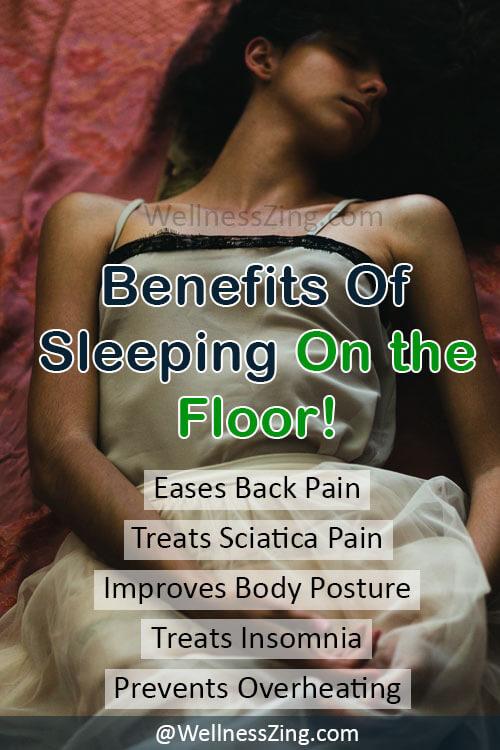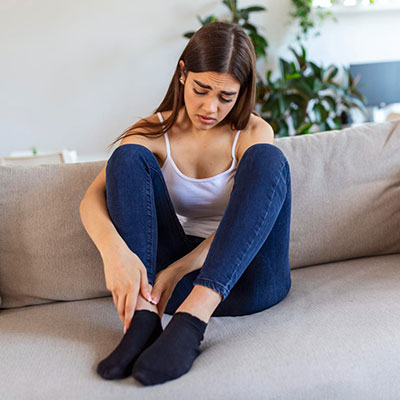Sleeping on the floor is not a new habit. In olden days, people used to sleep on the floor. They have hardly experienced pain in the back, neck, and shoulders. With passing time, trends have changed a lot. Modern lifestyle has got increasingly inspired by Western countries. Hard floor is now replaced by comfy bed, soft pillows, and blankets. This change has given rise to health issues like back pain.
Looking at the short-term, and long-term side effects of sleeping on bed, people are once again appreciating the concept of minimalist living. More and more health-conscious people are sacrificing their easy lifestyle, and adopting the new way of sleeping, i.e., “sleeping on the floor”. This post is beneficial for everyone who wants to know more about the floor sleeping style and reap its health benefits.
What Is So Special About Sleeping On The Floor?
Sleeping on mattresses is a recent phenomenon. Our ancestors had the habit of sleeping on the ground. There were no fancy and luxurious sleeping aids available at that time. Despite of comfortable sleeping accessories, people from primitive cultures had fewer musculoskeletal problems that is commonly seen among people in present scenario. This clearly indicates that we need to go back in time to keep ourselves fit, and healthy like our ancestors.
What Are The Benefits Of Sleeping On The Floor?
Sleeping on the floor provides a plethora of health benefits. It alleviates back pain, enhance posture, improve sleep and many more. Let us look more about it in detail.
1. Ease Back Pain
Sleeping on soft mattress doesn’t provide support to the pressure points in the body. It lets the body sink down, and causes the spine to curve. This ultimately leads to back pain. A medium- firm surface will provide equal pressure to the different pressure points in the body. It keeps your body at the uniform level, and improves your posture.
It helps to realign your posture to the natural posture of the body, and gives proper rest to different parts of the body. For people who do not have any prior experience of sleeping on the floor, may find it a little hard for a first few days.
After a week or two, your body will start to get accustomed to this new sleeping style. You should remember, that it may be a little discomforting at first, but good for your long-term health. If you have been experiencing slight back ache before due to improper mattress, then you will notice that it subsides with regular sleeping on the floor. This happens due to uniform alignment, and correct body posture in floor sleeping style.
2. Treats Sciatica pain
Sciatica is a kind of pain that is experienced in sciatic nerve that runs from the lower back to the buttocks, hips, and each leg. This type of pain is mostly caused due to a bulging disc. The cause of this pain, is somewhat similar to the cause of back pain, i.e., improper sleeping surface.
By opting for firmer sleep surface, you can reduce the intensity of this pain to a considerable level. Replace soft mattresses, by firmer mattresses as the former option exert stress on the joints, worsen your posture and round your spine. Sciatica patients will get relief from this pain after adopting floor-sleeping style.
3. Improves body posture
Sleeping on the floor makes your body posture right. Soft surfaces let the spine curve. On the other hand, hard surfaces offer support to them. Sleeping on the firm surface keeps your spine straight, and properly aligned. However, if you have spinal disorder like kyphosis or scoliosis, or a spinal injury, then you need to consult your doctor before adopting this sleeping style.
When you sleep on the floor it forces your neck, head and the back to come in one level. The entire body is correctly aligned and your posture becomes right. When even pressure is applied on the different parts of the body, you do not experience any signs of pain.
4. Treats Insomnia
Some people keep tossing, and turning throughout the night. In addition to stress, a poor sleeping surface is also a key cause for insomnia. There can be several negative consequences of poor sleep such as lack of concentration, mood fluctuations, irritability, lack of productivity, drowsiness etc. If your current mattress is giving you sleep issues, then try to sleep on the floor. You may face discomfort at first, but it will improve your sleep in the long run.
5. Prevents Overheating
Have you experienced your mattress getting hotter and you start to feel uncomfortable? Often, it disturbs the sleep of people a lot. Overheating has become a common problem that occurs when you sleep on a bad mattress. The heat that expels from the body at the time of sleep, gets stuck into the mattress material.
This makes the mattress hot, and so you feel hot. In order to prevent overheating, and sleep disturbances, you should start to sleep on the floor. Due to absence of any material, the heat expelled from the body doesn’t trap anywhere and nothing gets overheated.
Are there any Side effects of sleeping on the floor?
After seeing all the health benefits of floor sleeping, some people can experience side effects from this sleeping style.
1. Aggravate the Back Pain
If you are having any persisting back pain, or an excruciating back pain, then this problem can become severe if you sleep on the floor. In such a case, you may not benefit by floor sleeping style. Your muscles in the back are ruptured. To support weakened, and fragile tissues in the back, you need a soft sleep surface. Firm surfaces like floor may not be ideal for people with prolonged back pain, back disorders, or any back injury. Consult your doctor in these scenarios.
2. Limited mobility
People who either suffer from arthritis, or experience pain in their knees and legs, can start to feel more pain. This is because getting up from the floor during night daily can cause stress to the weakened bones, and sore joints. People with these health conditions, should avoid sleeping on floor.
3. Allergic reactions
If your floor is not properly cleaned on a daily basis, then floor sleeping can cause you contamination. It can be unhygienic for your health. The allergens such as dust, molds, and debris particles on the floor can pass into your body via breathing and cause allergy, and respiratory troubles.
Some of the problems that can be caused are as follows:
- sneezing
- itchy eyes
- runny nose
- coughing
- red eyes
- wheezing
- troubled breathing
- enhanced exposure to cold
4. Can cause you cold
In summer, as the floor is cooler compared to the temperature of the rest of the room, you will feel pleasant to sleep on floor. On the contrary, winters can make it a little uncomfortable. Cold floor can reduce the body heat, and can even catch you cold. So, you need to make necessary arrangements in the form of blankets etc. to prevent such discomfort.
Who should not sleep on the floor?
Not everyone is advised to sleep on floor. There are specific individuals, who are not appropriate for floor sleeping.
- People who are aged, have weaker bones and less fatty issues. In that case, floor sleeping can cause them pain in knees, while sitting, and standing. As the immune system slows down with age, elderly people can get cold soon.
- In addition to old people, and children, some people have low immunity that makes them catch cold very soon. It is also seen that people who have Anemia, Hypothyroidism, and Type 2 diabetes, catch cold soon. Sleeping on the floor can make them more susceptible to cough, seasonal flu etc.
- People, especially arthritis patients, who have difficulty in walking and moving due to weak bones, etc. should avoid sleeping on floor.
- Pregnant women should not sleep on floor. It can be taxing on the body. Any jerk while sitting, or standing can adversely impact the health, and development of fetus. Speak to your doctor of what type of mattress would be ideal for you as well as you baby.
How To Make Sleeping On The Floor More Comfortable?
Sleeping on the floor is a personal preference that doesn’t cause any side effects on a healthy individual. If you want to give floor sleeping a try, then follow the below tips to make your sleep experience more convenient.
1. Be Mentally prepared
Transition from a comfortable bed to a firm floor will never be easy at first. It is important to be prepared to face initial discomfort. You may experience slight body ache for a few days that will disappear as your body begins to get habitual of the new surface.
2. Look for the appropriate place
Place selection is also important for sleeping. Choose the place where there is no obstruction. It should be properly ventilated, clean, clutter free and hygienic. Prefer place that gives you adequate darkness for a restful sleep.
3. Select the proper surface
You do not need to sleep directly on the floor. Spread a yoga mat, a cotton mat, or any other firm sleep accessory, that you find comfortable sleeping on. You can use multiple layers of it as per your preference. Cover it with a fresh cover to keep it hygienic.
4. Invest in the right pillow
Just like the sleep surface, the pillow you choose also has an effect on the body, and quality of sleep. A too fluffy or spongy pillow can cause pain in your neck, and shoulders. So, selection of pillow is also critical. Doctors advise to use a thin pillow that raises your head a bit. Don’t keep several pillows beneath your head as you can experience strain in neck the very next morning.
5. Select the right sleeping style
There are three sleeping positions (on the back, on stomach, on side) that you can experiment to find what is suitable for you. In all these positions, you need to ensure that your spine remains uniformly aligned, with no pressure exerted at any specific area of the body.
- If you prefer sleeping to your side, then make sure your neck is in line with the spine. To get into this state, you may need to place a thin pillow or your arms under your head)
- If you sleep on the stomach, make sure it is not very high. It can cause pain in the neck.
- If you are a back sleeper, then you should elevate your knees by keeping them on a 2nd It will provide you an extra support. You can even put a pillow below your lower back to get your whole body in a straight line.
6. Practice patience
Just like any other habit, you need to keep doing it till your body get acclimatized to it. Give a few days to weeks to your body to adjust to the new sleeping place. Allow it to get accustomed. In place of sleeping for several hours, begin with a short nap. Slowly increase the duration. In due course, you will feel absolutely normal to sleep on the floor.
Conclusion
Floor-sleeping is not a new practice. It has been followed by several cultures throughout the world. Some people say that it assists in relieving back pain and also improve posture in a person. You need to note that floor-sleeping isn’t ideal if you have limited mobility, or suffer from any severe chronic condition. People who have any medical conditions, are advised to consult to doctor to determine the safety of this new sleeping style.
Hope you liked this article. Please share it with your family, and friends on social media. If you have any queries, then do write to us. We would be happy to solve them at the earliest.



















